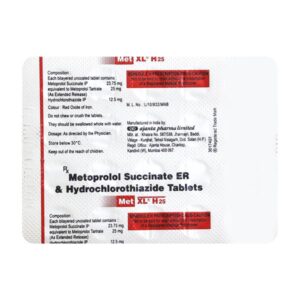HYDROCHLOROTHIAZIDE + METOPROLOL
Hydrochlorothiazide: Hydrochlorothiazide is a medication primarily used for treating high blood pressure (hypertension) and fluid retention (edema) caused by various conditions such as heart failure, kidney disorders, or liver disease. It belongs to the class of drugs called thiazide diuretics.
Its mechanism of action involves increasing the excretion of water and electrolytes, particularly sodium and chloride, by the kidneys. This results in a reduction in blood volume, decreased fluid accumulation, and subsequent lowering of blood pressure.
Hydrochlorothiazide is typically taken orally, usually once daily in the morning. The dosage may vary depending on the specific condition being treated and individual response. Commonly, the initial dose for hypertension is 12.5 to 25 milligrams per day, which may be increased if needed, under medical supervision.
As with any medication, Hydrochlorothiazide has potential side effects. Common side effects may include frequent urination, dizziness, lightheadedness, headache, muscle cramps, weakness, fatigue, and upset stomach. It may also cause electrolyte imbalances such as low levels of sodium, potassium, and magnesium. In rare cases, more serious side effects like allergic reactions, severe skin reactions, or liver problems may occur. It is crucial to discuss any concerns or unusual symptoms with a healthcare professional.
Additionally, it is important to note that Hydrochlorothiazide may interact with other medications, including certain diabetes drugs, nonsteroidal anti-inflammatory drugs (NSAIDs), and lithium. Hence, it is essential to inform the prescribing doctor about all other medications being taken.
Overall, Hydrochlorothiazide is a widely used medication for managing high blood pressure and fluid retention. However, its use should be under the guidance of a healthcare professional, and regular monitoring of blood pressure and electrolyte levels is necessary.
Metoprolol: Metoprolol is a prescription medication that belongs to a class of drugs known as beta-blockers. It is primarily used to treat high blood pressure, angina (chest pain), and certain heart rhythm disorders.
The main mechanism of action of metoprolol is to block the effects of adrenaline on beta receptors in the heart. By doing so, it reduces the heart rate and decreases the force of contraction, which leads to a decrease in blood pressure. This helps in controlling hypertension and angina symptoms.
Metoprolol comes in different formulations, such as immediate-release tablets, extended-release tablets, and injectable solution. The appropriate dose depends on the condition being treated and should be determined by a healthcare professional.
For hypertension, the initial recommended dose is usually 25-100 mg once daily, which can be adjusted up to a maximum dose of 450 mg per day. For angina, the initial dose is typically 50 mg twice daily, with a maximum dose of 400 mg per day. The specific dosing instructions may vary depending on the individual and their response to the medication.
Like all medications, metoprolol has potential side effects that may occur in some individuals. Common side effects include fatigue, dizziness, and low blood pressure. Other possible side effects include headache, nausea, vomiting, diarrhea, difficulty sleeping, and cold hands and feet. In rare cases, more serious side effects such as slow heartbeat, shortness of breath, swelling of the hands or feet, and mental/mood changes may occur. It is important to contact a healthcare professional if any concerning side effects are experienced.
Metoprolol should not be stopped abruptly without medical advice, as suddenly discontinuing the medication can lead to worsening of symptoms or a rapid increase in blood pressure. It is always essential to follow the prescribed dosage and consult with a healthcare professional regarding any concerns or questions related to the drug.


